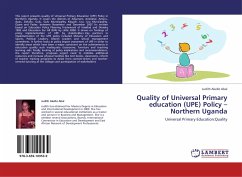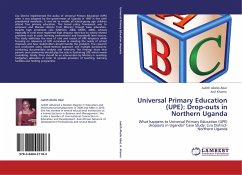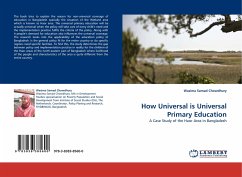This book analyses the chronology of events that led to the decline in quality primary education in Uganda. It highlights challenges of Universal Primary Education (UPE) implementation in Uganda as a response to achieving the Education For All (EFA) call. It reveals the challenges that the UPE programme has faced which have led to poor quality delivery of primary education. Developing countries like Uganda have quickly adopted the human capital theoretical views that relate human resource development to economic growth alongside, adopting human rights perspectives to education. Based on this background, UPE has been embraced as a means to achieving economic growth. In Uganda UPE was started in 1997; the country having suffered the effects of political instability that greatly crippled education for over a decade. This book is intended for scholars, education planners and development planners mostly in Africa.
Bitte wählen Sie Ihr Anliegen aus.
Rechnungen
Retourenschein anfordern
Bestellstatus
Storno








